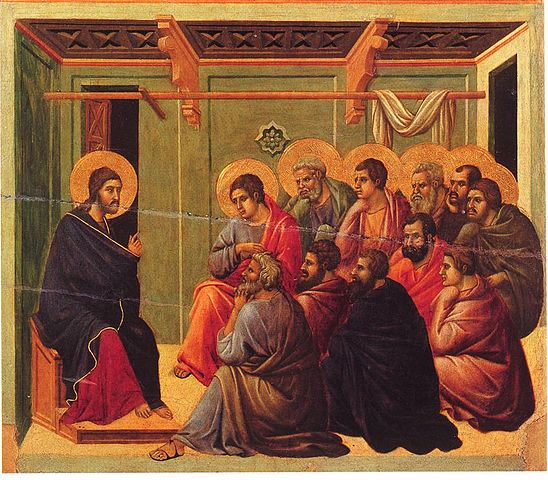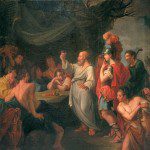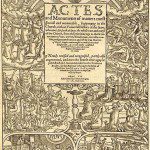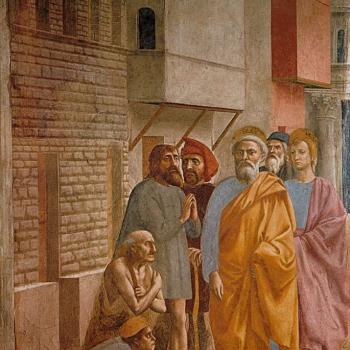A Brief Summary for Those Who Deny the Eucharistic Connection Altogether

Christ Taking Leave of the Apostles (bet. 1308-1311), by Duccio (1260-1318) [public domain / Wikimedia Commons]
* * * * *
I think there are various ways to make the parallel of John 6 to the Last Supper accounts of the three Synoptic Gospels. It was Passover time (Jn 6:4): as the Last Supper was (Mt 26:17, 19; Mk 14:12, 14-16; Lk 22:7-9, 15). Jesus distributed bread in a way similar to the Last Supper: 6:11 (RSV): “Jesus then took the loaves, and when he had given thanks, he distributed them to those who were seated.”
He fed the masses with bread (6:5, 12), in a sort of analogy to Holy Communion. The repeated analogy of Himself to bread is clearly eucharistic: 6:35, 41, 48, 50-51. Then the further introduction of the “blood” motif is another obvious eucharistic reference: 6:53-56. I don’t see how anyone could deny that this is eucharistic language.
Then He tops it off by saying that anyone who eats the bread and drinks the wine (flesh and blood) will “not die” (6:50), will “live for ever” (6:51, 58), will have “eternal life” (6:54), will “abide” in Christ, and He “in him” (6:56), will “live” (6:57). Those who don’t do it will “have no life” (6:53). The task then is to tie the salvation part of this to the synoptic accounts of the Last Supper. The closest the synoptic texts get is “my blood of the covenant, which is poured out for many for the forgiveness of sins” (Mt 26:28).
John doesn’t have the institution of the Lord’s Supper (instead he includes the eucharistic discourse of John 6), but there are clear indications that he is talking about the same event, minus the institution. He mentions that it was Passover (13:1), talks about Judas’ betrayal (13:2, 18, 21-22, 26-27), and the dipping of the bread (13:23-26), which is mentioned in the synoptics, too (Mt 26:21-23; Mk 14:18-20).
John simply highlighted other aspects of the Last Supper: Judas and the marvelous discourse. I think he knew that the other accounts would have the institution, and that they would all be complementary. Or he didn’t, and it just happened. I think that it’s impossible to deny the eucharistic theme in John 6 as its main thrust.












